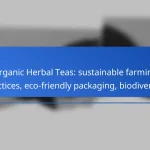What are the benefits of organic products?
Organic products offer numerous advantages, including improved health, environmental sustainability, and economic benefits. These products are grown without synthetic pesticides or fertilizers, which can lead to healthier food choices and a reduced ecological footprint.
Health benefits of organic foods
Organic foods are often fresher and free from harmful chemicals, which can contribute to better overall health. Many consumers report fewer allergies and sensitivities when consuming organic products due to the absence of artificial additives.
Additionally, organic produce tends to have higher levels of certain nutrients, such as antioxidants, which can support a healthier immune system. Choosing organic options can be particularly beneficial for vulnerable populations, including children and pregnant women.
Environmental advantages of organic farming
Organic farming practices promote biodiversity and soil health, which can lead to more resilient ecosystems. By avoiding synthetic chemicals, organic farms help reduce pollution and protect water quality, benefiting local wildlife and communities.
Moreover, organic farming often utilizes crop rotation and composting, which can enhance soil fertility and reduce erosion. This sustainable approach not only conserves resources but also contributes to long-term agricultural viability.
Economic impact of organic product consumption
The demand for organic products has been steadily increasing, leading to growth in the organic farming sector. This trend creates job opportunities in farming, processing, and retail, contributing positively to local economies.
Consumers are often willing to pay a premium for organic products, which can result in higher profit margins for farmers. Supporting organic agriculture can also stimulate local economies by encouraging the purchase of locally sourced organic goods.
How do organic products compare to conventional products?
Organic products are often viewed as healthier alternatives to conventional products due to their farming practices and lack of synthetic additives. While both types can provide essential nutrients, organic items typically emphasize natural growth methods and minimal chemical usage.
Nutritional differences between organic and conventional
Research indicates that organic products may have higher levels of certain nutrients, particularly antioxidants. These compounds are beneficial for health and can vary based on the type of organic produce and its growing conditions.
However, the nutritional differences can be subtle, and many conventional products still offer significant health benefits. Consumers should focus on a balanced diet that includes a variety of fruits and vegetables, whether organic or conventional.
Pesticide residue levels in organic vs conventional
Organic products generally have lower pesticide residue levels compared to conventional products, as organic farming restricts the use of synthetic pesticides. This can be particularly important for consumers concerned about chemical exposure.
According to regulations, organic farmers can use certain natural pesticides, but these are typically less harmful. Choosing organic can reduce the risk of pesticide ingestion, especially for vulnerable populations like children.
Flavor profiles of organic products
Many consumers report that organic products have superior flavor compared to their conventional counterparts. This difference can be attributed to the farming practices, which often prioritize soil health and biodiversity.
Flavor can vary widely among products, so personal preference plays a significant role. Trying different organic varieties may lead to discovering richer tastes and fresher produce, enhancing overall culinary experiences.
What types of organic products are available?
Organic products encompass a wide range of items, including fruits, vegetables, dairy, meat, and packaged goods. These products are grown and processed without synthetic fertilizers, pesticides, or artificial ingredients, adhering to specific organic standards.
Organic fruits and vegetables
Organic fruits and vegetables are cultivated without the use of synthetic chemicals, which can lead to healthier produce. Common organic options include apples, carrots, and tomatoes, often available at local farmers’ markets or grocery stores. When shopping, look for labels indicating USDA Organic certification to ensure compliance with organic standards.
Buying organic produce can reduce exposure to pesticide residues. However, it’s essential to wash all fruits and vegetables thoroughly, regardless of their organic status, to remove any dirt or bacteria.
Organic dairy and meat options
Organic dairy and meat products come from animals that are raised without antibiotics or growth hormones and are fed organic feed. Common organic dairy items include milk, cheese, and yogurt, while organic meat options often feature chicken, beef, and pork. These products are typically available in supermarkets and specialty stores.
When choosing organic meat and dairy, look for labels that specify the product is certified organic. This ensures that the animals were raised according to organic farming practices, which can lead to better animal welfare and potentially higher nutritional quality.
Organic packaged goods and snacks
Organic packaged goods and snacks include items like cereals, granola bars, and sauces made with organic ingredients. These products are designed to provide convenience while adhering to organic standards. Check for organic certifications on the packaging to confirm their organic status.
While organic snacks can be a healthier option, they may still contain high levels of sugar or salt. Always read the ingredient list and nutritional information to make informed choices, and consider balancing these snacks with whole, unprocessed foods for a well-rounded diet.
How can I identify certified organic products?
To identify certified organic products, look for labels that indicate compliance with organic standards set by recognized organizations. These labels often include specific certification marks that assure consumers of the product’s organic integrity.
Understanding organic certification labels
Organic certification labels vary by country but generally signify that the product meets specific agricultural practices. In the United States, for example, the USDA Organic label indicates that a product is made from at least 95% organic ingredients. In the European Union, the EU Organic logo serves a similar purpose, ensuring that products adhere to strict organic farming regulations.
When examining labels, pay attention to terms like “100% organic,” which means all ingredients are organic, versus “organic,” which allows for a small percentage of non-organic ingredients. This distinction can help you make informed choices based on your preferences.
Key organizations for organic certification
Several key organizations oversee organic certification globally, ensuring that products meet established standards. In the United States, the USDA is the primary authority, while in Europe, the European Commission sets the regulations for organic farming and labeling.
Other notable organizations include the Canadian Food Inspection Agency (CFIA) in Canada and the National Organic Program (NOP) in the U.S. Each of these entities has specific guidelines for certifying organic products, which can vary slightly based on local agricultural practices and consumer expectations.
What are the best practices for purchasing organic products?
To purchase organic products effectively, focus on sourcing from reputable suppliers and understanding labeling standards. Look for certifications such as USDA Organic or equivalent local certifications to ensure product authenticity.
Buying organic locally in farmers’ markets
Farmers’ markets are excellent venues for purchasing organic products directly from local growers. This not only supports the local economy but also allows you to ask questions about farming practices and product origins.
When visiting a farmers’ market, consider bringing reusable bags and cash, as many vendors may not accept cards. Look for seasonal produce, which is often fresher and more affordable.
Online retailers for organic products
Online retailers offer a convenient way to access a wide range of organic products, often with home delivery options. Popular platforms include dedicated organic stores and larger grocery chains with online shopping capabilities.
When shopping online, compare prices and check for customer reviews to ensure product quality. Be mindful of shipping costs and delivery times, as these can affect the overall value of your purchase.
What are the challenges of organic farming?
Organic farming faces several challenges, including higher costs, pest management difficulties, and regulatory compliance. Farmers often need to adapt their practices to meet organic standards while managing the economic implications of these changes.
Cost implications for farmers
The transition to organic farming can involve significant upfront costs, including organic certification fees, purchasing organic seeds, and investing in new equipment. These expenses can lead to a higher price point for organic products, which may deter some consumers.
Farmers may also experience lower yields during the initial years of conversion to organic methods. It’s common for yields to drop by 20-30% until the soil and ecosystem stabilize. However, once established, organic farms can achieve comparable yields to conventional farms.
Pest management in organic agriculture
Pest management in organic farming relies on natural methods rather than synthetic pesticides. This includes techniques such as crop rotation, companion planting, and introducing beneficial insects to control pest populations. Farmers must be proactive and knowledgeable about pest life cycles to effectively manage outbreaks.
While organic pest management can be effective, it often requires more labor and monitoring than conventional methods. Farmers should be prepared for potential pest challenges and consider integrated pest management (IPM) strategies to minimize losses while adhering to organic standards.
What are the future trends in organic products?
The future trends in organic products indicate a growing demand for sustainable and health-conscious options. Consumers are increasingly prioritizing organic items that align with their values, leading to innovations in farming practices and product offerings.
Increased Consumer Awareness
As more information becomes available about the benefits of organic products, consumers are becoming more discerning. They are seeking transparency in sourcing and production methods, which drives brands to adopt clearer labeling and ethical practices.
Technological Advancements
Advancements in technology are enhancing organic farming methods. Techniques such as precision agriculture and biotechnology are being integrated to improve crop yields while maintaining organic standards. This can lead to more efficient use of resources and reduced environmental impact.
Expansion of Organic Product Lines
Retailers are expanding their organic product lines to cater to diverse consumer preferences. This includes organic snacks, beverages, and even personal care items. The variety allows consumers to incorporate organic choices into all aspects of their lives.
Focus on Local Sourcing
There is a growing trend towards local sourcing of organic products. Consumers are increasingly interested in purchasing from local farmers and producers, which supports community economies and reduces the carbon footprint associated with transportation.
Regulatory Developments
Regulatory bodies are updating standards for organic certification to ensure integrity in the market. This includes stricter guidelines on labeling and production practices, which can enhance consumer trust in organic products.










